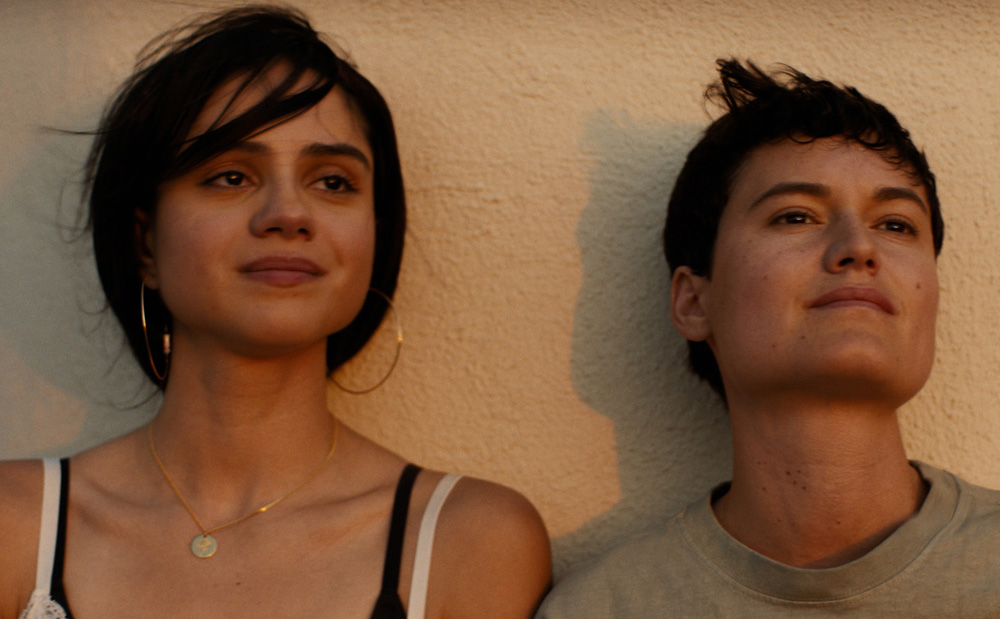Depending on who you ask and when, Vicente (René Pérez Joglar, better known as the musician Residente) can look like a caring father or one that’s hopelessly irresponsible in “In the Summers,” intent on showing his daughters Eva and Violeta a good time after shortly they’ve arrived to his home in Las Cruces, New Mexico, but when Eva rides the teacups until she throws up, onlookers worry about their safety. When someone suggests he should be more careful with the prepubescent girls, you can witness the anger that probably played a role in his divorce from their mother, with their custody agreement allowing him to have the sisters stay with him some time around May, and as Eva and Violeta grow up, they too can begin to see their father in a different light when being more permissive than other adults in their lives is at first endearing before realizing the consequences it’s had on others.
In Alessandra Lacorazza’s deeply moving debut feature, these summers are all the time you have with Eva and Violeta as they age from elementary school to considering college, elegantly played at various times in their life by Luciana Elisa Quinonez, Allison Salinas and Sasha Calle (Eva) and Dreya Castillo, Kimaya Thais and Lio Mehiel (Violeta), respectively. Surely, they’re shaped by other things in their lives, but the writer/director makes it feel as if you’re discovering a Rosetta Stone in the relationship they likely don’t bring up much of the rest of the year around others, picking up some aspects of their own attitude towards life from their temperamental father while being so repulsed by some such as his lack of dependability that it will embolden them to try and be better.
Although compassion may be difficult to come by in the heat of the moment from anyone on screen when no one feels entirely comfortable in knowing how to care for one another, Lacorazza dishes it out generously towards the young women who are only just starting to have enough experience to understand how much they should make their father a part of their lives, Carmen, the local bartender whose running tab for Vicente comes to include being a bit of a surrogate mother when he can dip in and out, and Vicente himself, who is at once elusive and the constant in their life and a fascinating dichotomy in other ways when he’s an unquestionably proud man in spite of clearly being beaten down by life and loathe to admit it to anyone. Even when Vicente can’t express himself properly, the film shows the toll his silence takes on everyone around him, yet equally ineffable is that certain something about him that prevents anyone from writing him off completely. While Lacorazza allows “In the Summers” to fall gracefully into the gentle rhythms of life in the Southwest, illustrating the subtle impact each visit to Las Cruces has on Eva and Violeta as time passes, the film itself is an emotional powerhouse as a family drama of the highest order.
After collecting the Grand Jury Prize for U.S. Dramatic Feature at Sundance and more recently picking up multiple prizes at Deauville, “In the Summers” is now arriving in theaters and recently, Lacorazza took the time to talk about the loosely autobiographical roots of the film, working with the actors on such nuanced and sensitive performances and showing grace under pressure during a production that occasionally would require four summers to be squeezed into one day.
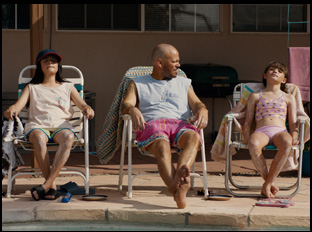
The structure was the first thing that came to me. I was sitting around many years ago with my sister, and we were just recalling the summers we spent with my dad, just [talking about] what happened this summer, trying to jog our memory and understand. And it struck me that this was a really interesting way to examine a life, seeing this father through the eyes of his daughters in these increments and not knowing what happened in between. That’s a bit reflective of what actually happened, because we wouldn’t often speak to my dad at all in the in the spaces we didn’t get to see him. So the structure was almost the easiest part, but figuring everything else out within that structure proved to be more difficult.
What was it like returning to this time in your life? As I understand it, you were conducting interviews with your family and diving back into old journals you kept.
Yeah, I approach all my projects with research, even if I’m the research subject. I’ve been keeping a journal since I was really young, so it was painful in some ways, also because your younger self is sometimes so embarrassing. You’re reading these things, and you’re like, “Ouch, that hurts.” There was that. But what I found out that was the most revelatory was the car accident [that becomes pivotal event in the film] because I was severely injured in it and I had made this whole narrative around what happened that I didn’t question for decades. I [would say], “We got a car accident, an ambulance came and then I woke up X amount of time later and it was a shit show.”
But what I found out after my dad died is that was completely wrong. We got in a car accident and he was by himself and had to pull us out and thought we were dead and just carried us on the street by himself until someone stopped to help him. That was such a pivotal moment of me transforming my whole life and starting to see his perspective because I’d always been self-involved — [concerned with] my trauma, my issues, my problems. Then for the first time, I [thought], “This is a part of his life and his trauma.” That just changed my whole perspective and was a bit of the impetus to make this film — to examine it through the eyes of the daughters, but understanding how it affected him as well.
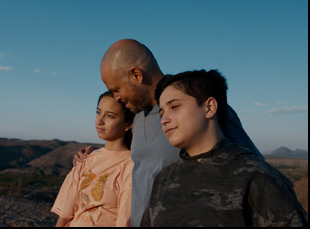
It was something that I questioned at every step of the way. For me, centering the POV on the dad at the very, very beginning, you’re leading the audience to think you’re in his head. You’re feeling his anxiety, you’re seeing his emotions and then very quickly switching to the girls. When he picks them up, all of a sudden we’re in their POV and that switch to me was highly important. Then each summer has a slightly different POV. We start with Violetta. We start to incorporate Eva by the third summer and then you’re just in Eva’s POV. And then it goes back to a more mixed POV in the last summer. Tracking those emotions for me were really important. Obviously within each scene, you can get more and more micro, but from centering it with Violetta’s POV at the beginning, you’re seeing [the father] with a specific lens — as a little bit dangerous and you’re making decisions that aren’t great, because Eva at that time is just enjoying the chaos, but then Eva symbolizes the hope, so as that hope gets extinguished, we’re seeing her POV and only getting glimmers of what he’s experiencing through their eyes.
René “Residente” Pérez Joglar is particularly great as the father and surprising, only because he’s never acted in a film like this before. What sold you on him to play such an important role?
I mean, I wasn’t sold on it. I was like, “Fuck, yeah.” [laughs] He didn’t come up in my head, even though I grew up with his music and my sisters are super fans of his. I never really thought of him as an actor, but we were exploring other actors and there were people I was excited about or not that excited about, but no one felt like a perfect fit. Then Alex Dinalaris, one of my lead producers, mentioned him, and I [thought], “Oh, a million percent. That’s exactly what I’ve been looking for.” Rene has all the qualities [to play the father] — he’s stereotyped as this macho Latin man when you look at him with the tattoos, but then you listen to his music or you get to know him and he’s incredibly intelligent. He has a huge sensitivity to him and that’s exactly what I wanted to try to capture in this character. So I was sold on it immediately. I just [wondered], would he do something like this? And I think he said yes, thinking the film would never get made. And the joke’s on him.
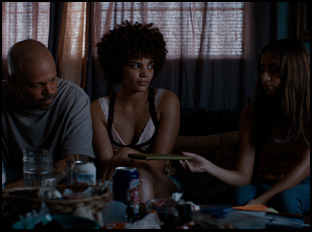
For me, it was always about the character and them understanding that character very specifically, even if it wasn’t based on something that was autobiographical. It wasn’t like “really this happened.” For example, when the [actress playing the] youngest Violetta came in, she had hair up to her butt — it was super, super long and we had her cut it [in the film]. And it was very dramatic and emotional because we carry so much emotions with our hair. But when she found out that wasn’t based on reality, she was like, “Wait, you made me cut my hair, but you never did that!” It was a funny moment because I was like, “It’s not about me. It’s about the character we’re building.” And to use the example of the hair [we could talk about] what does Violetta cutting her hair symbolize to her? What power does she feel? We talked about how she’s feeling more like herself and that that gives her confidence and empowerment, so it always went back to the character for me.
I’m guessing you couldn’t shoot exactly in sequence because it’s nearly impossible, but I have heard you might’ve started with the younger actors first. Did it give you a foundation?
Yes and no. We tried to give Rene at the beginning as many scenes as possible with the younger actors, but because of budget and time constraints with kids, it really was shooting it as mashed up as possible. We tried to do the bulk of the stuff with the younger girls at the beginning and the older ones at the end, but we’d shoot all four summers in a day [sometimes]. Some days were maybe only two summers, but we were going back and forth because [we also had to consider] the logistics of the house. It takes a long time to flip over the house to another summer, so the outside would be summer three, but then the inside would be summer four. And going back and forth, maybe the front of the house was a different summer than that. It was a little bit of a logistical nightmare to get there, but that dictated a lot of how we had to shoot the scenes, more so than what we wanted emotionally.
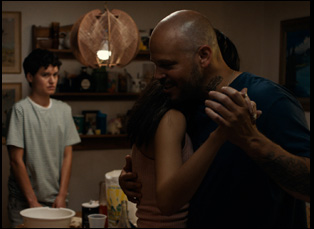
Usually because it was a small house, we couldn’t have everyone on set, so it was just whoever [had their scenes]. But for example, if there was a really emotional scene that we were shooting, I would invite Lio [Mehiel], who was the older Violetta, on set just to experience it so that they could incorporate some of that memory into themselves. I also had all the actors at the different ages walk into the house by themselves at different times. For me, it was about memory and it’s important to be in a space and have it infiltrate [their minds], so when they’re doing a scene in that same room later on and that house is changed, they can have a memory of how it changed and what they might have been feeling at the time when they were younger. It was more about trying to do that rather than having them be all together and interact. But I also wanted them to not mimic each other in a way because that to me can feel inauthentic. I just wanted them to feel the emotions that the other person was feeling, more so than try to embody them.
Your actors have said on many occasions that you were able to spend a great deal of time with them on set, which must be a challenge when you’ve got so many other things to worry about and it’s your first feature. Was it a tricky balancing act?
I think that’s inexperience and not knowing what I was supposed to do in some ways and just doing what I felt like I needed to do. [laughs] Some of my producers didn’t understand my shooting style and they’re like, “Why are you getting so many takes?” But I also come from an editing background, so sometimes I’m like, “We don’t have it yet. We have to keep going.” And it’s really important to have the actors also feel like confident that they got it, so whenever possible, I wanted to give time. I think it takes time to make art. It takes time to feel it. Sometimes you need a lot of takes for that within the time constraints, trying to stay as close to budget and time as possible and that’s why you have producers. That tension is really important, and I was trying not to worry about that too much and just trying to get what I needed and push for that. But you’ve got to block out some of that stress because if you bring that stress, then your actors are responding to your stress rather than responding to what they need to do. So I probably come off as a little too serious on set, but I just want to center myself and be able to be available to the actors to anything they need and block out the rest of the noise.
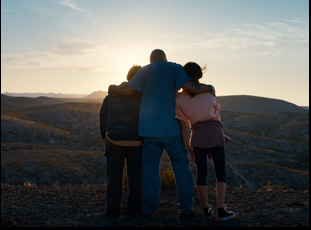
It’s been a beautiful process. In making it, my only goal was to make it as good as possible for me. I wanted to be proud of something. I don’t really think about the future. I’m just [thinking] one task in front of the other, so then to come out and be able to talk to audiences, that’s how you actually see how something’s resonating and be surprised by what people bring to it. I love it when someone sees something that I maybe wasn’t intending and now it’s no longer my film. It’s like the film is out in the world and it belongs to everyone else for them to love or hate or feel indifferent about on their own accord. That’s a beautiful process of surrendering it. People come up to me and say really personal things, but also sometimes people that I didn’t think would resonate with this film also [say], “You wrote my life,” and that to me is just really special — how I can connect with all sorts of people.
“In the Summers” opens on September 20th in New York at the IFC Center, Los Angeles at the Laemmle Royal and in Puerto Rico at the Fine Arts Miramar and the Fine Arts Popular. It will expand on September 27th and a full list of theaters and dates is here.




